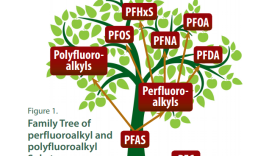The Natural Resources Defense Council and other groups are suing the U.S. Environmental Protection Agency over the agency’s temporary guidance policy that tables enforcement of pollution monitoring because of the coronavirus. EPA, in its policy, says it expects regulated facilities to comply with regulatory requirements and to return to compliance as quickly as possible.
NRDC attorney Jared Knicley says the EPA policy allows companies to use COVID-19 as a reason to stop monitoring and reporting pollution—without notifying the public.
“It’s a really important issue, particularly for the communities that are closest to these facilities, which tend to be communities of color and low-income communities that are also the hardest hit by the COVID crisis,” Knicley says.
Knicley says the EPA policy is especially dangerous given a recent Harvard School of Public Health study that shows that people with COVID-19 who live in U.S. regions with high levels of air pollution are more likely to die from the disease than people who live in less polluted areas.
NRDC and a coalition of environmental and public interest groups petitioned the EPA on April 1, insisting the agency issue an emergency rule requiring that companies taking advantage of the policy publicly disclose, in writing, when they stop monitoring or reporting their air and water emissions. That would then be disclosed to the public. Knicley says EPA ignored that request, prompting his group’s lawsuit asking a federal court to order the EPA to respond to the petition as soon as possible.
“And it’s really telling that, in this Administration, when industry asks for an across-the-board relaxation of pollution prevention requirements, which is what happened in this case, EPA grants that in the form of the policy within a few days, but when environmental and environmental justice and public interest groups ask for basic transparency into that process, we get the cold shoulder,” Knicley says.
Wes Gillingham is associate director of Catskill Mountainkeeper, one of the parties suing.
“This is a really ridiculous move by the EPA,” Gillingham says. “This covers all pollution sources, giving them a free ride on data and reporting.”
An EPA spokesperson says the agency does not comment on pending litigation. In a statement, the spokesperson says the EPA policy is a lawful and proper exercise of the agency’s authority under extraordinary circumstances. The statement continues, “As we’ve stated previously, contrary to reporting, EPA’s enforcement authority and responsibility remains active and the temporary guidance does not allow any increase in emissions. This is not a nationwide waiver of environmental rules. We will continue to work with federal, state and tribal partners to ensure that facilities are meeting regulatory requirements, while taking appropriate steps to protect the health of our staff and the public.” Again, the NRDC’s Knicley:
“EPA has said, since they first issued this policy and they got a lot of pushback, that they’re going to continue enforcing pollution limits,” says Knicley. “But if a regulated entity doesn’t have to monitor their air emissions or their water effluent or their drinking water quality, how is anyone going to know whether those limits are being violated. And that’s the importance of monitoring and reporting. Without that, there’s no transparency and there’s no basis for enforcement.”
Administrator Andrew Wheeler, in a March 26 press release, said, "This temporary policy is designed to provide enforcement discretion under the current, extraordinary conditions, while ensuring facility operations continue to protect human health and the environment."
Wes Gillingham:
“They just need to do their job,” Gillingham says. “It’s called the Environmental Protection Agency because they’re supposed to be protecting the environment and people. And that’s exactly what they’re not doing by this move.”
EPA's policy applies retroactively beginning on March 13. The agency says it will assess the continued need for and scope of the temporary policy on a regular basis.










